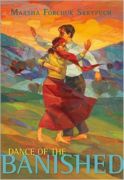
Dance of the Banished
Written by Marsha Forchuk Skyrpuch
Pajama Press, 2015, 227 pp.
ISBN 139781927485651
As the train pulled away, I looked out the window at the growing crowd, wondering if I would ever come back here again (p. 81).
In 1914, Ali gets lucky when Yousef, a village member, is too sick to make the journey from Anatolia (now modern day Turkey) to Canada for work. Ali is selected to go in Yousef’s place, but that means leaving behind his fiancé Zeynep. He cannot stay, but feels guilty for going. Zeynep both understands and yet is angry that Ali must leave. First divided by anger, then geographical distance, and eventually World War I, Dance of the Banished is about the fate of two young people of Kurdish Alevi descent as they negotiate life in Canada and Anatolia when they are caught within the hysteria of the war. Not Turkish, Armenian, or Muslim, the Kurdish Alevi were often victims of those biased against particular groups within the Anatolia region.
Dance of the Banished is based on true accounts about Alevi Kurds who were victims of war in Anatolia and the Canadian government’s internment camps in Ontario during World War I. The novel sheds light on the subtleties of cultural groups within geographical regions and their fate at the hands of the more powerful. Ali is in Canada, but is declared an “enemy alien” and considered part of 100 men falsely accused of a bomb plot and sent to an internment camp. Zeynep leaves her village in Anatolia to work with Christian missionaries who visited her village, hoping that by going with the missionaries she will find a way to get to Ali in Canada. Once in the city, however, the war disrupts Zeynep’s plans and she becomes witness to how the Turkish Revolutionary Forces treat Armenian Christians. She then becomes even more determined to find a way to get to Canada and Ali.
A dynamic and compelling story with likeable and realistic characters, this fictionalized narrative about how war often makes no distinctions between cultural groups will appeal to middle and secondary readers interested in history, romance, and how political movements on an international scale often wreak havoc at the local and individual levels. A deeply engaging plot that addresses many of the nuances of World War I, this book will make a great companion to Sanders’ series, The Rachel Trilogy, as well as Between Shades of Gray (Ruta Sepetys, 2012), which also address the concepts of movement, transitions, and how politics disrupt individual lives. It could also be used in a text set with books addressing the treatment of foreign nationals across the globe, such as So Much for Democracy (Kari Jones, 2014), Weedflower (Cynthia Kadohata, 2009), and even Wadsworth Longfellow’s classic poem Evangeline: A Tale of Acadie, which addresses the expulsion of French settlers from Nova Scotia.
Marsha Fourchuk Skrypuch was born in Canada, and currently resides in Brantford, Ontario. She has published numerous books about those whose stories are not often told, including six books on the Armenian genocide. Skrypuch has an author’s note that includes pictures of those within the internment camp as well as information about the sources of her story. More information can be found at her facebook page or at Goodreads.
Holly Johnson, University of Cincinnati
WOW Review, Volume VIII, Issue 2 by Worlds of Words is licensed under a Creative Commons Attribution-NonCommercial-ShareAlike 4.0 International License. Based on work at https://wowlit.org/on-line-publications/review/viii-2/
